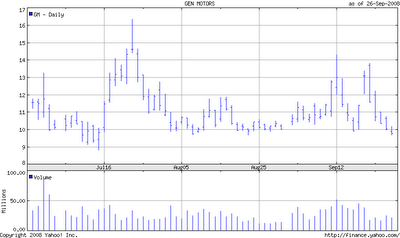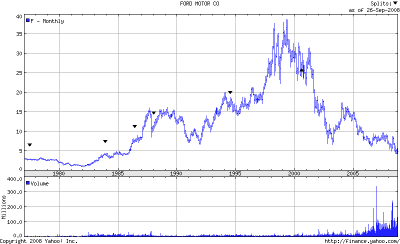skip to main |
skip to sidebar

 another casual but not final victim of the credit crunch might be GM/FORD. Chrysler has been privatized so it is not easy to gauge when it will fail.
another casual but not final victim of the credit crunch might be GM/FORD. Chrysler has been privatized so it is not easy to gauge when it will fail.
with current market conditions, all hell broke loose and there are reasons for slow sales:
- consumers' priorities now are to keep the house, put food on the table and get to work, none will induce customers to purchase another car or replace an old one. the decision will only be delayed further and further into the future which hurt car sales. unless car companies offer employee prices to most customers like GM did recently, there is very little incentive to upgrade cars or buy a new one;
- car companies do not lease cars to customers any more as it now costs more to finance a lease and residual value of the car after the lease is much less than previous years;
- fleet sales will also be hurt due to less business travelers thus car rental companies need not upgrade their fleet as frequent as before.
- aging is a factor that slows sales. current market turmoil had not been mentioning this factor lately.
both charts dont look too good, but GM's looks worse.
the 3 tops chart of GM looks likely to test south of the neckline now at 10 which was already broken on friday's close. since this is only a 3 month chart, it is highly likely that in the next month or so, it will test a low of 6 or even 4 if credit market conditions do not improve.
GM is unlikely to fail like that of aig once past the 10 dollar mark as indicated with ford's price now at 4.8 [it dropped below the 10 dollar mark back in 2005 and even earlier], but a failure will hurt triple the number employed by GM as many suppliers will go bankrupt too.
so watch out the stock price of GM/FORD if you are in the stock market still.
when the fed and a few central banks acted in concert to shore up the credit/stock market and those of aig, fannie and freddie in the past few weeks, we started hearing the stock market should be well and going up another 20% on top of friday's close.
even finance officials in hk such as financial secretary, financial services/treasury secretary have stopped issuing warning that the economy ahead is going south and now is the time to unload stocks to conserve cash, instead they act like cheer leaders forgetting the team they are cheering is down more than 20% from the recent top 23000.
i have even heard on the radio that a prominent finance professor suggested that in order to regulate these i-banks, we must employ similar people, otherwise the government would not understand what the banks are dealing with and how risks can be measured. if this is the kind of professors we have in our universities and they act as advisors to the govt, then we are in big trouble. even the inventors of these instruments themselves cannot accurately measure or estimate the ultimate risks involved, otherwise why they are now in such bad shape, so how can the government offer attractive enough salaries to people who would do the ultimate risk management.
the causes for the financial chaos in the usa are very simple:- low interest rates for too long - which fanned the fire on all kinds of speculation [properties, stocks, commodities etc], read this blog on greenspan and for pointing this out way back in 2004;
- running out of common sense judgment - the fed and us govt officials have ignored common sense judgment for too long on mortgages with no down payment and interest only mortgages [those that have a low fixed interest rate for a few years and then marked way up after the initial concession period]. why would people have interest in paying for mortgages when the houses they own have no equity or negative equity. in allowing zero down payment, the fed and treasury are setting themselves up for trouble ahead. interest only mortgages can be for small amounts only and not for the purchase of a brand new house, why would the banks or FIs think the borrower can afford higher interest rates a few years down the road not to mention then the payment for the principal will also kick in as well?
- ceo overly compensated, the pay scheme encourages undue risk - all ceos in the usa received compensation according to the stock prices and do not have any claw back should profits fall short in the future, thus everyone maximizes stock prices within their own reign to max out their own compensation with no regard to social concerns or their employees. we are actually going back to the old ages of imperialism of landlords and slaves, only that these days, there are few big landlords around, but ceos in their place, other employees being slaves. ceos already enjoy numerious perks like clubs, first class air travel or private jet, almost unlimited budget for entertainment [tyco ceo use public money on art pieces in his own home]. many people argue that ceos do deserve their compensation, but they are gambling other people's money for their own gain. if people do research on ceo's pay and tie it to the company results on a moving 3 years basis, i have doubts they are highly correlated. they brag more on their pluses but never the minuses so they got compensated whichever way it goes. ceo always talk about team spirit, then why should one person be compensated so much while others sacrifice when the results of the company is not highly correlated to his pay.
common sense judgement is always necessary in governing the finance of an economy or companies - the dotcom era that companies can be valued on the number of visitors to a website is pure nonsense if it cannot generate revenue enough in the long run to balance their books, then investors would be throwing good money after bad if these companies get their revenue from investor contributions only and not from traditional sales revenue.
we should look beyond the current market rise and what would be happening to lehman's liquidation process, aig's unwinding or unloading of risky assets which would cause a serious drop in profits for a lot of banks thereby hitting investors eventually not to mention the rise in unemployment [due to bank merger or liquidation] will also impair consumption in the states that will have final effects on producers around the world thus affecting the stock prices of these exporters and banks [absorbing bad loans to these cos] esp in asia.
having said that, we should be unloading stocks not buying more.




